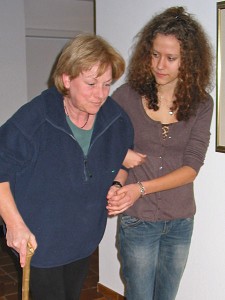Tag Archives: Scotland
Life should go on after caring stops
Carers have a lot of skills and experience to offer once they stop care-giving but we need to offer them more support.
6th August 2014
by DR JOYCE CAVAYE
Carers: is there life after care-giving? Have you or anyone you know, ever been an unpaid carer? Three in every five people will be carers at some point in their lives so it is likely that you will know someone who is or has been a carer.
The number of carers in the UK is estimated to be around 6.5 million.
In Scotland, there are about 650,000 unpaid carers providing care and support to family members, partners, friends and neighbours who are affected by ill health, frailty or disability. These numbers are projected to rise over the next 20 years, in response to an aging population and fewer social services.
Carers unveil new book offering support
Barbara Shearer (Mayfield), Wanda Gosz (Penicuik) and Patricia Thorp (Mayfield) at the launch of the new booklet
Midlothian carers have put pen to paper to produce a new booklet aimed at supporting people who care for those with dementia.
The booklet was launched as part of National Carers’ Week.
Identifying and supporting informal carers
Carers need to be encouraged to see themselves as carers

Image credit: Produnis
In this guest post, Dr Emma Carduff and Dr Anne Finucane, co-authors on a new paper published today in BMC Family Practice explain why it’s important to support the carers of people approaching the end of their lives.
Approx. 10% of the UK population have an unpaid caring role for a family member or friend. Many of these carers make a significant contribution to supporting people who are approaching the end of their lives. With increasing numbers of older and frailer people in the population, informal carers will play a vital role in caring for family members as health deteriorates and end of life approaches. In particular, care from informal carers, who are generally family members, is essential for those who wish to be cared for in their own home.
Carers can experience poor physical and psychosocial wellbeing, yet they remain largely unsupported by health and social services. It is essential that carers are supported both to maintain their own health and wellbeing and to care for their family member or friend. However, before they can be supported, carers need to be identified.






